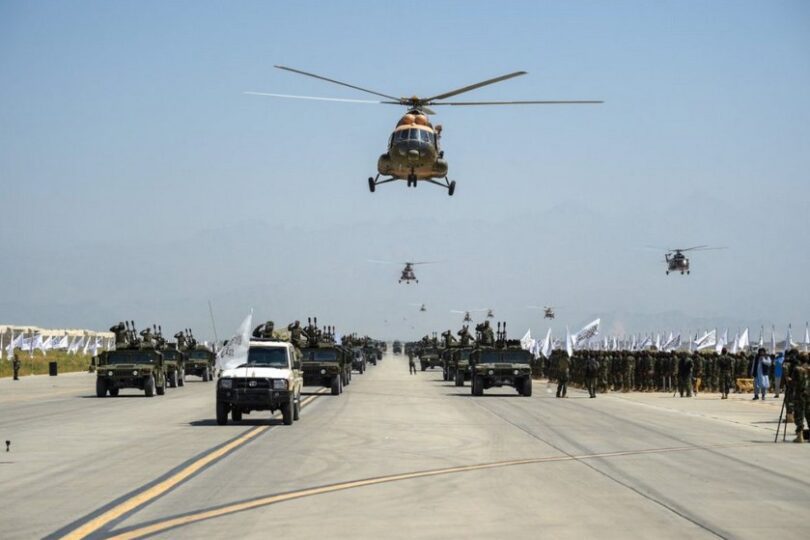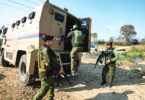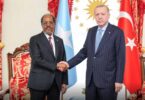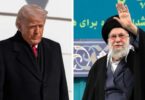US President Donald Trump’s prudent and confidential negotiations with the Afghan Taliban came to light after America declared its intent to regain control of Bagram Airbase in Afghanistan.
It is evident that the US views the Bagram air base as not only a lost military asset since its withdrawal from Afghanistan in 2021 but also as means to monitor the growing influence of China. The intention to reacquire the airbase became visibly apparent after President Trump at a joint press conference with British Prime Minister Keir Starmer on 18 Sept 2025, expressed the US interest in Bagram air base by stating “One of the biggest airbases in the world, we gave it to them for nothing. We’re trying to get it back, by the way. That could be a little breaking news”. He further clarified that the need to bring the airbase under the US control rises from the close proximity of the areas where China manufactures its nuclear weapons. He claimed that the base is “an hour away from where China makes its nuclear weapons.” According to Trump “If Afghanistan doesn’t give Bagram back to those that built it, the United States of America, bad things are going to happen.”
Despite Trump’s confident declaration to regain control of Bagram, Zakir Jalaly, an official at the Afghan Foreign Ministry, rejected the idea of Bagram returning to America.
Mujahid said that U.S. should consider adopting a policy of “realism and rationality.”
Taking to X, he added that Afghanistan had an economy oriented foreign policy and sought constructive relations with all states on the basis of mutual and shared interests.

Taliban sentiments were further reinforced when the chief of staff at Afghanistan’s Defense Ministry, Qari Fasihuddin Fitrat, also stated, “Ceding even an inch of our soil to anyone is out of the question and impossible”.
It is apparent that Taliban has defined their stance in regards to the sovereignty of Afghanistan and their role as the government controlling the nation. This also displays Kabul’s shift from being utilized as a theatre for power conflicts as seen in the past.
In response to Trump’s assertions and in support for Afghan government, a spokesperson from the Chinese Foreign Ministry on 19 Sept 2025 clarified that China respects Afghanistan’s independence, sovereignty, and territorial integrity, and that “Afghanistan’s future should rest in the hands of the Afghan people”.
It is imperative to mention that US has not formally acknowledged the Afghan government since the Taliban came to power in 2021. However, in March 2025, a US state department spokesperson confirmed of having dropped the bounties on key Taliban /Haqqani network leaders such as Sirajuddin Haqqani, his brother Abdul Aziz Haqqani and brother-in-law Yahya Haqqani. Despite the certain gesture of appeasement, the Taliban continue to remain Specially Designated Global Terrorists and the Haqqani Network continues to be designated as a Foreign Terrorist Organization.
While at the time, the US move may have been dubbed as “a result of continued diplomatic efforts" by some, it can now be accessed as a calculated act to gain some sort of strategic depth in Afghanistan.
Also, it can be anticipated that the current developments leading to the Afghan dismissal of the US plan will certainly increase tensions between the two nations. US can be expected to levy sanctions and delay the efforts for Taliban’s recognition on the international platform.
US can be expected to pressure the Taliban, given its own growing perturbation over China’s advancing military technology and its close association with Russia, North Korea and other nations from the Shanghai Cooperation Organization (SCO).
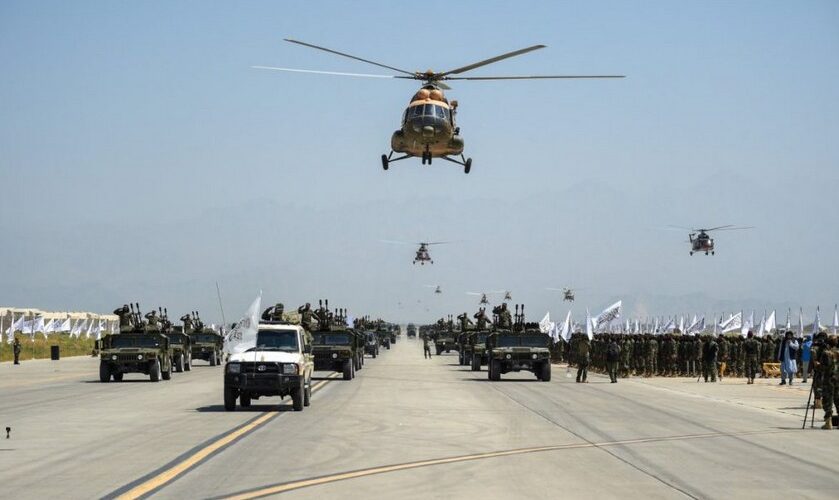
If US were to secure Bagram under its control, it would be able to execute a greater influence in Central and South Asia.
China’s defence budget remains the second to the United States. In 2024, the US Defence Intelligence Agency (DIA) reported that China had embarked on “most rapid expansion and ambitious modernization of its nuclear forces in history—almost certainly driven by an aim for enduring strategic competition with the U.S.”
This expansion was ascertained to extend to the development of nuclear capabilities which meant build-up of nuclear missile silos; ground-mobile, air-launched, and submarine launched weapons and other nuclear capabilities.
According to US Department of Defence, China has exceeded over 600 operational nuclear warheads in its stockpile as of 2024 and estimates that they will surpass over 1,000 operational nuclear warheads by 2030.
In July 2021, satellite images of construction of a large nuclear missile silo field in China’s Xinjiang Province surfaced. China has 20 silos for liquid-fuel DF-5 ICBMs. There are confirmed reports of 120 silos under construction at Yumen, 110 silos at Hami, a dozen silos at Jilantai. The recent 2025 Chinese Defence budget also shows 7.2% increase since its 2024 budget. These factors certainly add to US worries and its desperation to gain Bagram base to monitor and increase its aerial surveillance and signal intelligence to monitor Russian military activity as well as Chinese infrastructure projects under the CPEC is becoming vital to its interest. Additionally, Afghanistan sits in the heart of emerging trade corridors. Hence, having control of Bagram would give a strategic advantage over the economic routes China and Russia intend to secure.
In the past the Bagram base served as the hub for counter terrorism and the US was able to monitor the Islamist spill over in the region from Afghanistan. This has become a concern for China and Russia, who have to deal with the growing threats from outfits like Isis Khorasan (ISKP), Al Qaeda and TTP. Since 2021, certain groups or outfits have utilized the Afghan soil to carry their operations or jihadist plans. So, Bagram base becomes a much sought after counterterrorism asset.
Also, with US acquiring the air base would introduce an additional player in the region which would give rise to conflicts with the Taliban, stifle U.S. resources, and also increase diplomatic challenges.


